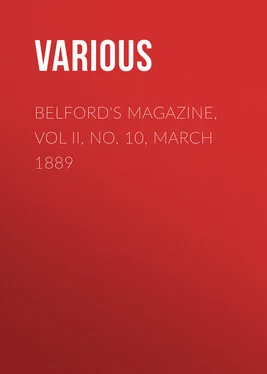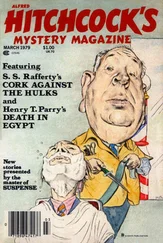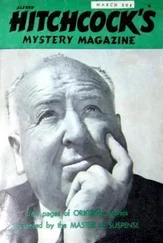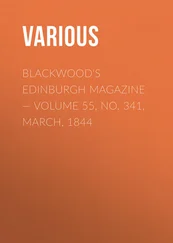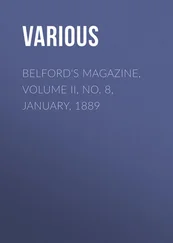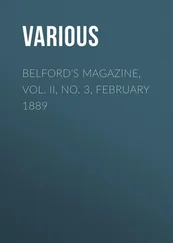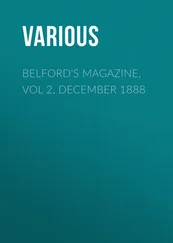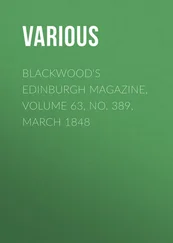Various - Belford's Magazine, Vol II, No. 10, March 1889
Здесь есть возможность читать онлайн «Various - Belford's Magazine, Vol II, No. 10, March 1889» — ознакомительный отрывок электронной книги совершенно бесплатно, а после прочтения отрывка купить полную версию. В некоторых случаях можно слушать аудио, скачать через торрент в формате fb2 и присутствует краткое содержание. Издательство: Иностранный паблик, Жанр: periodic, foreign_edu, на английском языке. Описание произведения, (предисловие) а так же отзывы посетителей доступны на портале библиотеки ЛибКат.
- Название:Belford's Magazine, Vol II, No. 10, March 1889
- Автор:
- Издательство:Иностранный паблик
- Жанр:
- Год:неизвестен
- ISBN:нет данных
- Рейтинг книги:5 / 5. Голосов: 1
-
Избранное:Добавить в избранное
- Отзывы:
-
Ваша оценка:
- 100
- 1
- 2
- 3
- 4
- 5
Belford's Magazine, Vol II, No. 10, March 1889: краткое содержание, описание и аннотация
Предлагаем к чтению аннотацию, описание, краткое содержание или предисловие (зависит от того, что написал сам автор книги «Belford's Magazine, Vol II, No. 10, March 1889»). Если вы не нашли необходимую информацию о книге — напишите в комментариях, мы постараемся отыскать её.
Belford's Magazine, Vol II, No. 10, March 1889 — читать онлайн ознакомительный отрывок
Ниже представлен текст книги, разбитый по страницам. Система сохранения места последней прочитанной страницы, позволяет с удобством читать онлайн бесплатно книгу «Belford's Magazine, Vol II, No. 10, March 1889», без необходимости каждый раз заново искать на чём Вы остановились. Поставьте закладку, и сможете в любой момент перейти на страницу, на которой закончили чтение.
Интервал:
Закладка:
Of these was Kate Severn, aged eighteen – a tall, brown-skinned, brown-eyed, brown-haired creature, so richly and freshly tinted that these three shades blended, in a beautiful harmony, in a face of rounded lines and gracious curves such as belong alone to the lovely time of youth. She was an affectionate and dutiful daughter to her widowed mother, whose only child she was, and yet almost everyone who heard Kate Severn talked about at all heard her called cold, the basis of this appellation being a disinclination to the society and attentions of young gentlemen, which, in a girl of her age and appearance, seemed a positive eccentricity. She had had this trait from a child, when she would fly into sudden rages and fight and scratch the little boys who called her their sweetheart; and it had grown with her growth. Every summer, when she and her mother would come back to the old country-place, near the dull little town of Marston, where all the summers of her life had been spent, this determination to avoid the society of young men was more resolutely set forth by her looks and tones. It was not so aggressive as formerly, for she had acquired a fine dignity with her advancing girlhood, and was too proud not to avoid the danger of being called ridiculous. Therefore, her resentment of all masculine approaches was now quiet and severe, where it had once been angry and vehement; but it was as positive as ever, as the youth of Marston had reason to know. They said they didn't mind it, but they did immensely. A favorite remark among them was that, if she could stand it, they could – and stand it she did, magnificently. Who that saw her, driving her smart trap and strong bay horse along the country roads of Marston, with rein taut and whip alert, her erect and beautiful figure strikingly contrasted with her little mother's bent and fragile one, could suppose for one instant that it mattered an atom to her whether those were men or wooden images that walked the streets of Marston or drove about its suburbs, having their salutes to the tall cart returned by a swift, cool bow from its driver, who disdained to rest her handsome eyes upon them long enough to discern the half-indignant, half-admiring gazes with which they looked after her.
She was not, at heart, an unsocial creature, and in her childhood had been rather a favorite with the girls who came in contact with her, but she always was unlike them; and this dissimilarity now constituted a distinct isolation for her, since the fact that she had herself no beaux, – to use the term in vogue in Marston society, – and took no interest in hearing of those of her girl friends, left the latter much at a loss for topics, and forced upon Kate herself the conviction that she had not the power of interesting them. Dr. Brett, the country doctor who was her mother's physician and chief friend when she came to her country home, used to try to adjust matters for Kate, and made many praiseworthy efforts to promote a spirit of sociability between her and the young people of Marston, each and every one of which was a flat failure. At last he had given up in despair and let the matter drop, for Kate, in this her eighteenth summer, was more difficult, as well as taller, straighter, and handsomer, than ever. So reflected Dr. Brett as he drove homeward from his first visit to the Severns, feeling a good deal cheered by the recurrence into his humdrum life of this attractive mother and daughter, who received him into their home with a cordiality and friendliness enjoyed by a few people only. Mrs. Severn was an invalid, and unequal to seeing much company; and Kate, though the very opposite of an invalid, had contrived, as I have shown, to cut herself off from society – in Marston, at least – rather effectually. She liked Dr. Brett, and seemed always glad to see him – a departure in his favor which he was not old enough to relish altogether. Still, the gods had provided him a pleasant spot of refreshment in the midst of a rather dull professional routine, and he gladly made the most of it. Kate, who was extremely fastidious, criticized him severely to her mother, and regretted very often that a man who had some capabilities should neglect his appearance as he did – allowing his face and hands to get so sunburned, his hair to grow so long, and his clothes to look so shabby and old-fashioned.
Perhaps the reason that she was so hard upon good Dr. Brett was accounted for by the fact that this man-repudiating young lady carried about in her mind a beautiful ideal of her own, of whose existence, even in this immaterial form, no being in the world besides herself had a suspicion. His appearance, in truth, was wholly and entirely ideal, but he was founded on fact, and that fact was a certain manuscript which five years ago she had fished up from an old box in the garret. This garret had been for generations the receptacle for all the old, disused belongings of the Severns; and it had been Kate's delight, from childhood up, to explore its old chests and trunks, and invent for herself vivid stories of the old-time ladies and gentlemen to whom had belonged these queer old gowns and uniforms – these scant petticoats and meagre waists, and these knee-breeches and lace-trimmed coats. There were spinning-wheels and guitars to suggest poses for the women, and cocked hats and swords for the men. As she grew older, these childish games lost part of their charm for her, and these mere suits and trappings of the creatures of her imagination gave her such a sense of lack that she turned to some old papers in one of the boxes, in the hope that she might get some light upon the spirits and souls that had animated them. In her own fair young body there had arisen certain insistent demands which there was nothing in the life she led to supply. The tortures of the Inquisition would not have drawn this confession from her; but so indeed it was, and I must have sketched the personality of this young lady very clumsily indeed if it has not appeared that, beneath this independent, self-sufficing surface, there was a heart full of romance and sentiment, a feeling all the stronger for being denied a vent.
It was an era in Kate Severn's life – that rainy day in late summertime, when she found in the garret the old roll of manuscript from which was formulated the ideal that afterward so wholly took possession of her. It was a budget of closely written sheets, on blue paper turned white at the edges with age. The ink used must have been of exceptionally good quality, for it was still dark and distinct. The writing was clear, and done with a very fine pen – but there were evidences of haste. This, however, was not to be wondered at, for the subject was an exciting one, and Kate pictured to herself, with enthusiasm, the exquisite young gentleman (whom she promptly invested with the blue-velvet, lace-ruffled coat, and the handsome hat and sword which were among the paraphernalia of the attic) bending his ardent, impassioned gaze over the sheets on which were written such beautiful, fervent, reverential love-words. It was not in the form of a letter, though it was a direct appeal, or, rather, a sort of aspiration, from the heart of a man for the love of a woman. There was not a name in it from beginning to end, and there was a sort of impersonal tone in it that made Kate believe that it was addressed to an imagined woman instead of a known one. This thought occurred to her even in that first breathless perusal, and all the subsequent ones (which were countless, for she was subject to certain moods in which this old manuscript was her only balm) confirmed it. In consequence of this conviction, she did a most un-Kate-like thing. It required only a slight effort of that powerful imagination of hers to put herself in the place of this loved and importuned lady; and she actually went so far as to compose and indite answer after answer to this fond appeal – impassioned outpourings of a heart which was full and had to be emptied. These she would lock away in her desk, along with the precious blue manuscript – and read and amplify from time to time.
Читать дальшеИнтервал:
Закладка:
Похожие книги на «Belford's Magazine, Vol II, No. 10, March 1889»
Представляем Вашему вниманию похожие книги на «Belford's Magazine, Vol II, No. 10, March 1889» списком для выбора. Мы отобрали схожую по названию и смыслу литературу в надежде предоставить читателям больше вариантов отыскать новые, интересные, ещё непрочитанные произведения.
Обсуждение, отзывы о книге «Belford's Magazine, Vol II, No. 10, March 1889» и просто собственные мнения читателей. Оставьте ваши комментарии, напишите, что Вы думаете о произведении, его смысле или главных героях. Укажите что конкретно понравилось, а что нет, и почему Вы так считаете.
